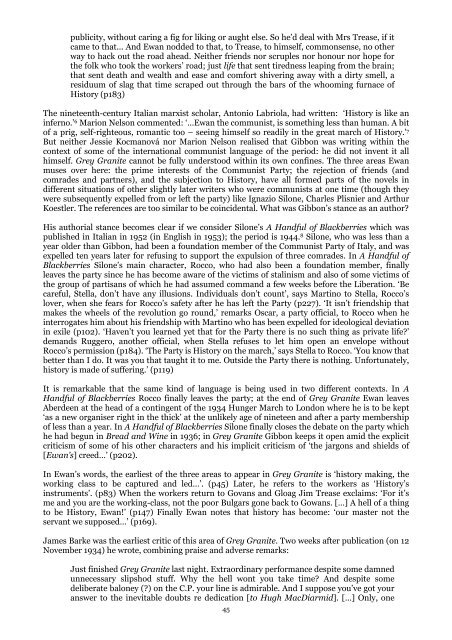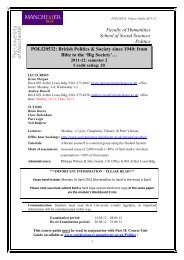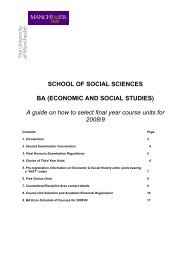CHNN 22, Spring 2008 - School of Social Sciences
CHNN 22, Spring 2008 - School of Social Sciences
CHNN 22, Spring 2008 - School of Social Sciences
You also want an ePaper? Increase the reach of your titles
YUMPU automatically turns print PDFs into web optimized ePapers that Google loves.
publicity, without caring a fig for liking or aught else. So he’d deal with Mrs Trease, if it<br />
came to that... And Ewan nodded to that, to Trease, to himself, commonsense, no other<br />
way to hack out the road ahead. Neither friends nor scruples nor honour nor hope for<br />
the folk who took the workers’ road; just life that sent tiredness leaping from the brain;<br />
that sent death and wealth and ease and comfort shivering away with a dirty smell, a<br />
residuum <strong>of</strong> slag that time scraped out through the bars <strong>of</strong> the whooming furnace <strong>of</strong><br />
History (p183)<br />
The nineteenth-century Italian marxist scholar, Antonio Labriola, had written: ‘History is like an<br />
inferno.’ 6 Marion Nelson commented: ‘…Ewan the communist, is something less than human. A bit<br />
<strong>of</strong> a prig, self-righteous, romantic too – seeing himself so readily in the great march <strong>of</strong> History.’ 7<br />
But neither Jessie Kocmanová nor Marion Nelson realised that Gibbon was writing within the<br />
context <strong>of</strong> some <strong>of</strong> the international communist language <strong>of</strong> the period: he did not invent it all<br />
himself. Grey Granite cannot be fully understood within its own confines. The three areas Ewan<br />
muses over here: the prime interests <strong>of</strong> the Communist Party; the rejection <strong>of</strong> friends (and<br />
comrades and partners), and the subjection to History, have all formed parts <strong>of</strong> the novels in<br />
different situations <strong>of</strong> other slightly later writers who were communists at one time (though they<br />
were subsequently expelled from or left the party) like Ignazio Silone, Charles Plisnier and Arthur<br />
Koestler. The references are too similar to be coincidental. What was Gibbon’s stance as an author?<br />
His authorial stance becomes clear if we consider Silone’s A Handful <strong>of</strong> Blackberries which was<br />
published in Italian in 1952 (in English in 1953); the period is 1944. 8 Silone, who was less than a<br />
year older than Gibbon, had been a foundation member <strong>of</strong> the Communist Party <strong>of</strong> Italy, and was<br />
expelled ten years later for refusing to support the expulsion <strong>of</strong> three comrades. In A Handful <strong>of</strong><br />
Blackberries Silone’s main character, Rocco, who had also been a foundation member, finally<br />
leaves the party since he has become aware <strong>of</strong> the victims <strong>of</strong> stalinism and also <strong>of</strong> some victims <strong>of</strong><br />
the group <strong>of</strong> partisans <strong>of</strong> which he had assumed command a few weeks before the Liberation. ‘Be<br />
careful, Stella, don’t have any illusions. Individuals don’t count’, says Martino to Stella, Rocco’s<br />
lover, when she fears for Rocco’s safety after he has left the Party (p<strong>22</strong>7). ‘It isn’t friendship that<br />
makes the wheels <strong>of</strong> the revolution go round,’ remarks Oscar, a party <strong>of</strong>ficial, to Rocco when he<br />
interrogates him about his friendship with Martino who has been expelled for ideological deviation<br />
in exile (p102). ‘Haven’t you learned yet that for the Party there is no such thing as private life?’<br />
demands Ruggero, another <strong>of</strong>ficial, when Stella refuses to let him open an envelope without<br />
Rocco’s permission (p184). ‘The Party is History on the march,’ says Stella to Rocco. ‘You know that<br />
better than I do. It was you that taught it to me. Outside the Party there is nothing. Unfortunately,<br />
history is made <strong>of</strong> suffering.’ (p119)<br />
It is remarkable that the same kind <strong>of</strong> language is being used in two different contexts. In A<br />
Handful <strong>of</strong> Blackberries Rocco finally leaves the party; at the end <strong>of</strong> Grey Granite Ewan leaves<br />
Aberdeen at the head <strong>of</strong> a contingent <strong>of</strong> the 1934 Hunger March to London where he is to be kept<br />
‘as a new organiser right in the thick’ at the unlikely age <strong>of</strong> nineteen and after a party membership<br />
<strong>of</strong> less than a year. In A Handful <strong>of</strong> Blackberries Silone finally closes the debate on the party which<br />
he had begun in Bread and Wine in 1936; in Grey Granite Gibbon keeps it open amid the explicit<br />
criticism <strong>of</strong> some <strong>of</strong> his other characters and his implicit criticism <strong>of</strong> ‘the jargons and shields <strong>of</strong><br />
[Ewan’s] creed…’ (p202).<br />
In Ewan’s words, the earliest <strong>of</strong> the three areas to appear in Grey Granite is ‘history making, the<br />
working class to be captured and led…’. (p45) Later, he refers to the workers as ‘History’s<br />
instruments’. (p83) When the workers return to Govans and Gloag Jim Trease exclaims: ‘For it’s<br />
me and you are the working-class, not the poor Bulgars gone back to Gowans. […] A hell <strong>of</strong> a thing<br />
to be History, Ewan!’ (p147) Finally Ewan notes that history has become: ‘our master not the<br />
servant we supposed…’ (p169).<br />
James Barke was the earliest critic <strong>of</strong> this area <strong>of</strong> Grey Granite. Two weeks after publication (on 12<br />
November 1934) he wrote, combining praise and adverse remarks:<br />
Just finished Grey Granite last night. Extraordinary performance despite some damned<br />
unnecessary slipshod stuff. Why the hell wont you take time? And despite some<br />
deliberate baloney (?) on the C.P. your line is admirable. And I suppose you’ve got your<br />
answer to the inevitable doubts re dedication [to Hugh MacDiarmid]. […] Only, one<br />
45
















